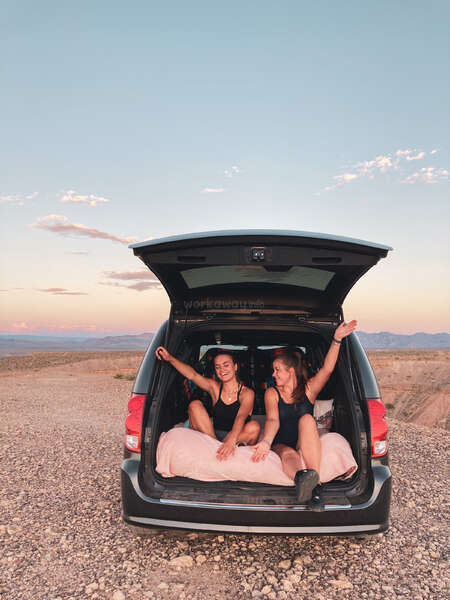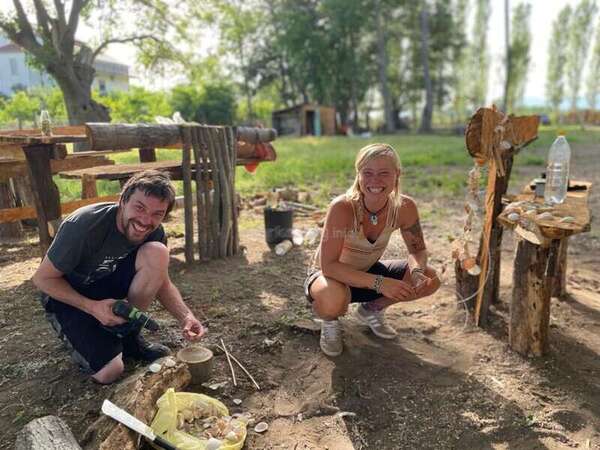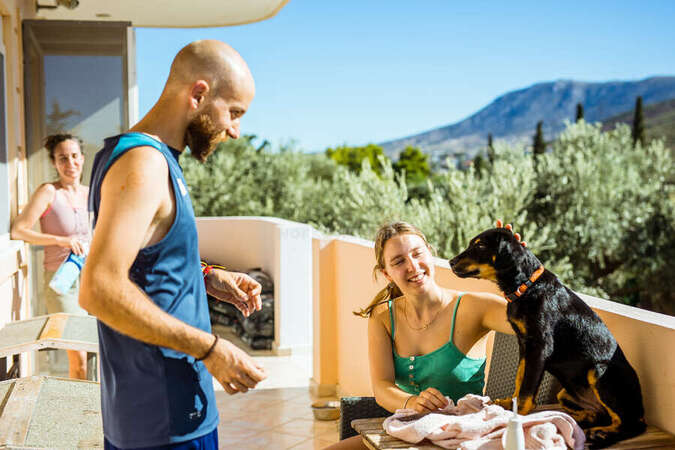How to travel on a budget using the sharing economy
If you had the choice between paying full price for a service or paying less for a similar service rented from a stranger online, which option would you go for?
What is a sharing economy?
How does a sharing economy work?

Benefits of sharing economy:
- Save money: When you’re travelling on a budget, not only do you want to spend less, you want to carry less too. This means a sharing economy is ideal as you are able to rent or borrow equipment as and when you need it. No need to buy new, no need to try to sell it on when you’re finished or have to take it with you to your next destination.As well as physical items, you can save money with house sitting instead of hotels, car relocation instead of car rental and so much more! By using a sharing economy you will be able to travel longer but on the same budget.
- Authentic experiences: The joy of a peer-to-peer economy is exactly that. It is powered by real people. With real people come authenticity and the opportunity to escape the same old tourist traps. Those offering their services or items are not profit-hungry corporations, they’re people like you and me which allows a genuine insight into the local way of life.
- Reduce environmental impact: Here at Workaway we champion sustainable travel and believe we all play a role in protecting our planet. There are many ways we can all be better travellers and one of them is reducing the items we buy new. With the sharing economy, it encourages us to reuse more and buy new less. This means fewer natural resources are being used and fewer new goods are being produced. It also means owners can make money from their items rather than throw them away.

Sharing Economy Platforms for Budget Travel
Transport
- Parking – Any motorist in any country will tell you, one of the hardest parts of driving is finding a parking space! Whether it’s finding affordable long-term parking, finding somewhere to park in a new city or simply a cheaper space at the airport there are sites such as JustPark in the UK or Divvy in Australia that allow you to use other people’s spaces for a fraction of the cost.
- Car share/Car pool – Rent cars from locals using car-sharing sites such as Get Around or Turo. Traditional car rental can be inflexible and overpriced, but these options allow you to find a specific vehicle from anywhere between a few hours to a few weeks. Sites such as BlaBlaCar or liftshare also allow you to carpool safely, saving you money and time!
- Relocation – Instead of an expensive car rental, try using a relocation platform instead. They allow you to road trip in style whether in a car, RV or campervan at a fraction of the cost of a traditional rental. For example, for as little as $1 per day Imoova will match your route and dates with vehicles needing relocation. With relocations available in Australia, New Zealand, USA, Canada and Europe, it’s perfect for those with a small budget but a huge bucket list.
- Taxis – While taxis are often feared by budget travellers due to the unpredictable and expensive cost, there are cheaper options. Alongside Uber and Lyft there are apps such as grab which offers car-pooling, ride-sharing, private vehicle hire and more.
- Boats – Why borrow a car when you can borrow a boat? While you can use Workaway to sail around the world for free, there are sites that connect local boat owners with avid sailors. From the Seychelles to Sicily there’s Sailogy, the “AirBNB for boats” getmyboat or sailo for a little luxury for less. Looking for somewhere to dock? Use connectthedocks or dockshare to rent a dock from a local.

Hospitality
- House sitting – House sitting is one of the best examples of a sharing economy platform. The homeowner gets someone to look after their house and/or pets for free, while the traveller gets to live in a local’s home instead of paying for a hotel or hostel. There is also the bonus of a fluffy friend for company.While Workaway offers house sitting, you can also join Homestay, TrustedHousesitters or Housinganywhere. Most house sitting sites ask for an annual membership fee, but they’re often cheaper than a night in a hotel! House sitting not only lets you stay comfortably for less, it means you have access to amenities such as kitchens, laundry, or even gyms or swimming pools - for free!
- Home swapping – If you’re concerned about your home sitting empty while you travel, why not try a home swap instead of a house sit? Again, for a yearly fee you can live like a local in their home, while they enjoy the comforts of your home. Platforms such as Home Exchange or Love Home Swap are industry leaders in this concept.
- Bargain Hotel Stays – If you don’t fancy the responsibility of looking after someone’s home or pets, Roomer is the platform for you. It allows people to sell hotel rooms that they have booked but can no longer use. They get rid of their room and still make money, you get a bargain hotel stay. What’s not to love?
- Cyclist Stays - If you’re an avid cyclist, Warmshowers is the hospitality network for you. With over 185,000 users across the globe it is a community catered to connecting cyclists and hosts.
- Free accommodation – As one of the original sharing economy platforms, couchsurfing offers travellers a free place to stay while meeting with locals all over the world. Nowadays, there are hundreds of similar sites such as BeWelcome (available in over 225 countries) and Trustroots which sells itself as a hospitality website for hitchhikers.

Camping/ Campervans
- Rent a vehicle – Camplify (available in Australia, the UK, Spain and New Zealand) or RV Share (US wide) allows you to rent a campervan, RV, or trailer when it's not in use. This also means a huge discount in comparison to the standard rental prices.
- Camping gear – While camping is one of the best ways to save money when travelling on a budget, the upfront cost of equipment and the effort of carrying it place to place puts so many travellers off giving it a go. That’s why a sharing economy is your BFF. With sites such as Arrive Outdoors, Expeerent or Shurable offering everything you need for an adventure from base layers to bear safety.
- Rent a camping space – Once you have a vehicle or tent sorted the next expense is finding a camping spot. Campsites can not only be expensive, but they can be super crowded which takes away the joy of the great outdoors. Instead, use these sharing economy platforms that cater to campers. You’ll save money and have a more private, unique spot away from the crowds and toilet queues.
- Homecamper – allows you to camp in a garden, park or private land. With 58,000 pitches available in over 42 countries.
- Boondockers Welcome – This platform offers free RV parking on private property across the US and Canada.
- Harvest Hosts – Fancy camping on an alpaca farm? How about a vineyard? If you fancy a campsite with a difference this is the platform for you.
- Hip Camp - Discover and book tent camping, caravan parks, glamping or even tree houses with Hip Camp. With epic camping experiences available in the U.S., Canada, Australia, New Zealand, the UK and France but more locations added daily!

Work Exchange
- Workaway - One of the best examples of a sharing economy platform is our very own, Workaway. In exchange for volunteering your time, you receive free accommodation (and usually food.) The lifelong friendships and priceless experiences are simply a bonus! With over 50,000 opportunities across 170 countries there is a Workaway experience to suit all styles of traveller. Whether you’re an eco warrior, passionate about marine conservation or keen to teach abroad, Workaway has a host for you.
- Help Exchange – Alongside Workaway there are other similar platforms where your time is rewarded with free accommodation and food. HelpX (short for help exchange) offers homestays in exchange for help with work including gardening, cooking and farming among others. WWOOF (worldwide opportunities on organic farms) is ideal for those who want to work in nature, learn about permaculture and the rural way of life.

Activities and Food
- Bikes/surf/snowboard – Bikes are one of the best ways to navigate a new place. They allow you to head off the beaten track where cars can’t reach, and there are no carbon emissions. Win, win! Similar to surfboards and snowboards however, they aren’t so easy to squeeze in your backpack. However, thanks to spinlister you can find a bike, SUP or snowboard near you from thousands of locations worldwide.
- Skip the tourist traps – If you only have a short time (or a small budget) in a destination, there is often no room for error. You don’t want to waste time or money on subpar experiences or food. That’s why you need to download like a local. It is an online platform where locals share their tips on the hidden gems from food to photo opportunities and even offer tours to allow all visitors to experience their city like they do.
- Language exchange – Whether you want to get a head start before you arrive or you crave a more authentic experience, one of the best ways to live like a local is to learn their language! With platforms such as speak you can meet people from all over the world, while learning about a new language and culture.
- Coworking – if you’re hoping to work as well as play during your travels, coworking platforms are a great way to share skills and find work spaces at a fraction of the fee that hiring an office would be. MovingWorlds for example helps to connect professionals wanting to donate their skills to startups and social enterprises around the world. There is also Seats2meet which helps to match inspiring professionals and provides coworking spaces in exchange for knowledge.
- Eat like a local – If you travel through your taste buds, sites such as BonAppetour or Eatwith are for you. While dining at local restaurants can be pricey, these sites allow you to dine in a locals home at a more affordable price. They also offer cooking lessons and culinary experiences led by locals, allowing a more authentic and educational insight.

About Lauren
Growing up in a small coastal village in Scotland inspired Lauren to seek adventure and challenge the norm. Armed with just her backpack and trusty travel companion Darren, she quit her day job to liv
Share the Workaway idea
9 comments
Join the Workaway community today to unlock unique volunteer experiences and free accommodation with over 50,000 opportunities around the globe.
Join Now





